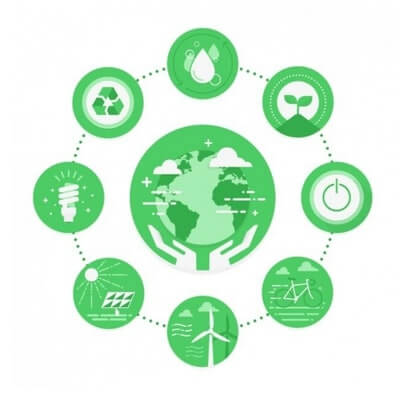

The Indian Government MOEFCC introduces Green Credit Rules in 2023 to incentivize eco-friendly actions. Environmental credit systems are mechanisms designed to encourage and reward businesses and organizations for adopting environmentally friendly practices.
Usually, these systems involve the issuance of credits or MOEF Certification to entities that demonstrate a commitment to sustainable and eco-friendly activities. These credits can be traded or used to meet regulatory requirements. Understanding the power of green credit rules and their potential to reshape a country's circular economy is important.
“Green Credit” means a singular unit for an incentive provided by a specified environmental activity that positively impacts the environment. Whenever a person or organization positively benefits the environment. The activity is referred to as a green credit.
The MOEFCC Green Credit Rules under Implementation Guidelines 2023. The Credit rules carry some common objectives that promote environmentally sustainable practices and eco-friendly projects:
1. Promotion of Green Technologies
Encourage people to adopt eco-friendly technologies and innovation by providing financial support to projects that invest in and deploy green technologies.
2. Biodiversity Conservation
Support environment projects that contribute to the conservation of biodiversity, protection of endangered species, and the restoration of ecosystems.
3. Climate Change Mitigation
The aim of the Indian MOEFCC Green Credit Rules is to Promote investments in projects that contribute to mitigating climate change, such as those focused on energy efficiency, renewable energy, and low-carbon technologies.
4. Creation of Tradeable Green Credits System
The Green Credit Rules Introduced for MOEF Approval are based on the environment-conscious actions undertaken by people or entities. These green are created tradable on the domestic market platform, allowing those who have earned them to trade or sell them to other entities in the market.
The green credit programs encourage industries, companies, and other entities to fulfill the required environmental obligations.
1. Compliance with Environmental Standards
Make Sure that your businesses and projects adhere to basic environmental regulations and global eco standards, fostering responsible and compliant practices.
2. Incentivizing Green Practices
Green Credit provides financial incentives, including favorable interest rates or other benefits, to entities adopting green and sustainable practices in their operations.
3. Sustainable Development
Green Credit Rules 2023 align with crit and financial activities with follow the principle of sustainable development that ensures that economic growth is environmentally responsible and socially inclusive.
For more details, please visit Metacorp
Green Credit programs can vary based on the country, financial institutions, and organizations implementing the green credit program:
Often green credit training is combined with the environment industry or carbon markets. Several authorities both governmental and non-governmental, are typically involved in the oversight, regulation, and implementation of green credit trading programs. The specific organizations can vary depending on the countries. Here are some common entities involved:
To understand more about the Green Credits Program, click HERE
1. Government Environmental Agencies
Often, National or regional environmental agencies are responsible for overseeing and regulating green credit trading programs. MOEFCC Introduces Green Credit Rules, standards, and protocols for the generation and trading of environmental credits.
2. Financial Regulatory Authorities
In some cases, financial regulatory authorities may be involved to make sure that all business activities go along with financial regulations and standards. They help to maintain transparency, fairness, and market integrity.
3. Emission Reduction Program Administrators
The green credit program aims to overcome greenhouse gas emissions that usually involve administrators who maintain and oversee the environmental implementation of projects generating emission reduction credits. These administrators are governmental bodies or private organizations authorized by the MOEFCC.
4. Carbon Exchanges or Trading Platforms
Organizations or exchanges facilitate the buying and selling of environmental credits. These can be private entities or government-sponsored exchanges where market participants trade credits in a regulated environment.
5. International Organizations
For international carbon markets, global organizations like the United Nations Framework Convention on Climate Change (UNFCCC) play a significant role in setting standards and overseeing international carbon trading mechanisms such as the Clean Development Mechanism (CDM) or Joint Implementation (JI).
6. Research Institutions and NGOs
Non-governmental organizations (NGOs) and research institutions may contribute by providing expertise, research, and advocacy to support the development and improvement of green credit trading mechanisms.
7. Project Developers
Organizations or entities involved in developing projects that generate environmental credits are important players. They established initiatives that overcome emissions or contribute to environmental sustainability, leading to the creation of credits.
8. Verification and Certification Bodies
Independent third-party verification and certification bodies are usually involved to ensure the legitimacy of green environmental credits. They verify that environment projects adhere to established standards and criteria.
9. Market Participants and Traders
Organizations, financial institutions, and other entities looking to buy or sell environmental credits actively participate in the trading market.
Implementing green credit rules is a very complicated procedure, below we mentioned some challenges while authorities implement green credit rules in 2023.





We are the pioneers in offering environmental consulting services to our patrons, giving us the first mover advantage & keeping us ahead of our competitors.
Very experienced in filing, monitoring & submission of CDSCO Compliances, Drugs Manufacturing & sale guidelines, Environmental Impact Assessment, AERB consulting services, Pollution Control Board CTE & CTO Advisory Services, Waste Management Authorization from State Pollution Control Boards, Fertilizers & Insecticides Manufacturing, Wholesale & Import Compliances
